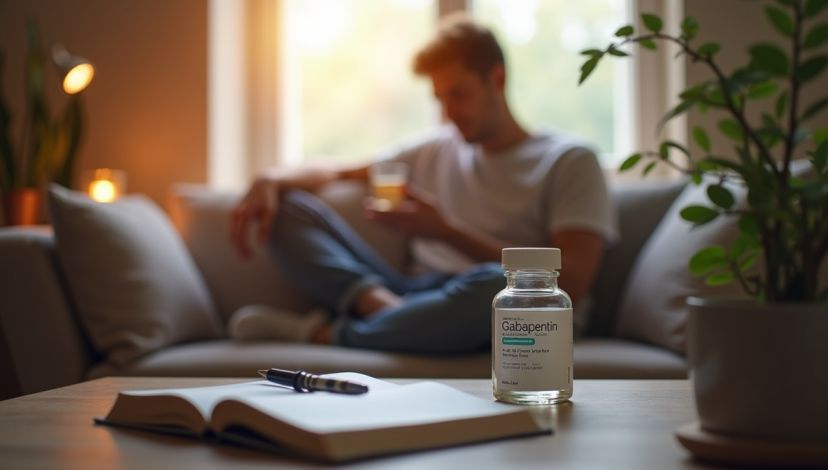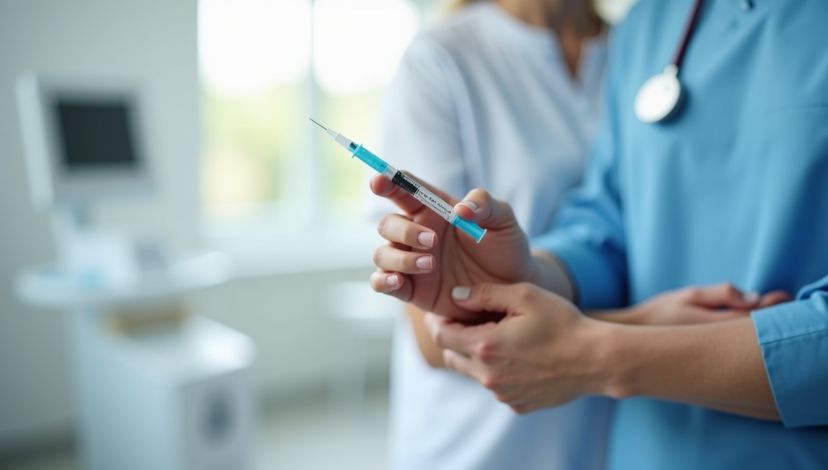Millions of people in the world experience anxiety, and this is why it has become one of the most prevalent mental health problems. To some people, it is just overwhelming to find the appropriate treatment as they all have different responses to medications and side effects. Gabapentin for anxiety is gaining attention as an alternative option, especially for those who have not found relief with traditional anxiety medications.
Gabapentin is an off-label drug that was originally invented to treat seizures and nerve pain, but it was later on used to treat anxiety symptoms. It has a special action that calms down the nervous system, which may be a relief, yet, when compared to other drugs, it does not carry the risks of addiction.
In this article, we will explore the use of gabapentin for anxiety in depth—how it works, effectiveness, safety concerns, and alternatives. Be it you are thinking of taking some gabapentin or just in need of some succinct expert knowledge about the same, the guide will help you get a clear, unambiguous sensible insight into your thought process.
Key Takeaways
- Gabapentin is another alternative to the management of anxiety symptoms, which is not addictive.
- Anxiety relief may need several weeks to achieve complete effects with the help of gabapentin.
- Gabapentin is used in situations where the conventional anxiety drugs cannot be used or do not work.
What Is Gabapentin and How It Helps on Anxiety?
Gabapentin is a drug that is given out under prescription, which was originally aimed at seizure treatment and pain in the nerves. It functions by affecting the nerve messages in the brai,n especially by imitating the soothing neurotransmitter, gamma-aminobutyric acid (GABA). Gabapentin is not GABA but regulates the nerve activity in the brain, providing it with a calming effect, which could decrease the symptoms of anxiety.
Researchers are of the opinion that gabapentin influences calcium channels dealing with voltage in nerve cells, which consequently regulates the discharge of neurotransmitters associated with anxiety and stress responses. This unique mechanism is not based on other conventional anti-anxiety drugs such as benzodiazepines or SSRIs, as the ones based on the other brain chemicals. It is due to this fact that gabapentin can be a worthwhile alternative in certain cases.
Real-Life Insight:
A psychiatrist told of patients with social anxiety and some with panic disorders who showed particular improvement when gabapentin was prescribed to them, particularly those who have not responded well to SSRIs or benzodiazepines.
Effectiveness of Gabapentin for Anxiety: What Does Research Say?
Although gabapentin is not approved as a treatment of anxiety (and its use is considered to be an off-label use), some studies indicate that it might be effective in the treatment of anxiety in some cases.
Clinical Findings
- One relevant randomized controlled trial has been done in breast cancer survivors having anxiety. A significant reduction in anxiety with the use of gabapentin (300 mg or 900 mg daily) as compared to placebo was already evident in the first four weeks of treatment, and a dose of 300 mg was frequently found to be optimal in the balance between efficacy and tolerability.
- Another indication where gabapentin has produced results include preoperative anxiety, where patients that had been administered with gabapentin before their surgery reported reduced anxiety levels compared to those that were administered with a placebo.
- Studies on pediatric surgery found reduced anxiety after surgical operations among the children which received gabapentin in the vicinity of the time of surgery.
- There have been case reports of benefit in social anxiety disorders and panic disorders, but more substantial studies are yet to be completed to prove the same.
| Condition | Gabapentin Effectiveness | Notes |
|---|---|---|
| Breast Cancer Survivor Anxiety | Significant | 300 mg effective, 4-8 weeks onset |
| Preoperative Anxiety | Moderate | Helpful before some surgeries |
| Pediatric Surgery Anxiety | Positive | Reduces post-op anxiety |
| Social Anxiety Disorder | Promising but Limited | Needs more research |
Table 1. The summary of the efficiency of Gabapentin in Various Anxiety Situations.
ALT text: Comparative performances of gabapentin in various anxiety-related disorders.
Although this is encouraging, it is observed that the use of gabapentin is only considered as a secondary form of treatment. Generalized anxiety and panic disorders have a better evidence to other drugs, such as the SSRI.
Dosage, Side Effects, and Safety: What You Need to Know.
The Introduction of gabapentin starts with a low dose and increments the drug gradually depending on the response of the patient and tolerability. Doses of anxiety are also varied and resulted in 300 mg to as high as 3,600 mg per day in divided doses.
Side effects that are common
- Dizziness and drowsiness, or fatigue
- Lethargy or dizziness, or unsteadiness
- Inflammation of a part of the limbs or hand
- Gastrointestinal disorders, GI upsets
Warning: This medication should be used as directed by a healthcare provider to reduce the adverse effects and improve its safety.
Safety Profile
Gabapentin is less likely to be dependent on or abused in comparison with the traditional benzodiazepines. Gabapentin shows a strong safety record. It works especially well for patients who can’t take other anxiety medications or have a history of substance use disorders.
Nonetheless, other drugs may interact with each other, and clear communication with your healthcare provider is of the essence as far as avoiding complications is concerned.
Comparison of the dosage graph
| Medication | Common Starting Dose | Max Daily Dose | Dependency Risk | Notes |
|---|---|---|---|---|
| Gabapentin | 300 mg | Up to 3600 mg | Low | Off-label for anxiety use |
| Benzodiazepines | Variable | Variable | High | High potential for abuse |
| SSRIs (e.g., Sertraline) | 25-50 mg | Up to 200 mg | Low | First-line anxiety meds |
Table 2: Table of Dosage and dependency comparison with the Anxiety medications.
ALT text: gabapentin, benzodiazepines, and SSRIs comparison identify doses and their dependency risks.
What is the Comparison of Gabapentin with Other Treatments of Anxiety?
When common anxiety drugs like SSRIs and benzodiazepines fail or are contraindicated or have side effects that are not tolerable, one alternative or addition is under consideration: Gabapentin.
- SSRIs (Selective Serotonin Reuptake Inhibitors): These are first-line drugs that are mostly prescribed to anxiety patients since they have strong clinical inferences. They take several weeks to work and may have such side effects as nausea or sexual dysfunction.
- Benzodiazepines: They are fast-acting and have the risks of dependence and tolerance, as well as have the problem of withdrawal, so they are not best in the long term.
- Gabapentin: The middle ground has a calming effect and is also less addiction-prone, which makes it especially helpful with patients who have a complicated treatment background.
Treatment Expert Insight:
A pharmacologist observes, “The special effect of gabapentin could be conducive to SSRIs, and it could thus play a significant add-on benefit of treatment-resistant anxiety.” Nevertheless, its application is not as popular as front-line monotherapy due to fewer research studies and certain limitations of use.
real-life application Considerations and Real-life Use Case
Consider an example of a patient, called Sarah, with generalized anxiety disorder (GAD), and who has been unsuccessful with various SSRIs with little improvement. Her doctor prescribes gabapentin 300 mg a day after conducting a complete assessment. Over four weeks, Sarah gradually calms her anxiety without feeling sedated, which surprises her. Her doctor adjusts the dose to 600 mg/day. This change greatly improves her quality of life.
Note of caution: Whenever taking any medication, it is always important to consult a healthcare professional first, especially when taking other medications or having other health problems.
This is often the case with patients, especially with a complicated case of anxiety or those who are in search of alternatives that have low addictive value.
Conclusion
Gabapentin for anxiety represents a promising, though still off-label, option for managing symptoms, especially when traditional therapies fall short. It has its own way of operation, a relatively benign safety record, and a possible utility in various forms of anxiety, such as social anxiety, preoperative anxiety, and anxiety in the context of chronic disease.
Gabapentin may play a key role in a personalized anxiety treatment plan. Doctors usually adjust the dose carefully to reduce side effects. Although it takes several weeks for the effects to appear, many patients gradually experience improvements over time.
If standard medications haven’t worked for your anxiety, speak with a healthcare professional—they might guide you toward effective alternatives like gabapentin. To explore more options, read our article Hydroxyzine for Anxiety: 7 Must-Know Facts [2025] Guide.
FAQs
Q1: Does the use of gabapentin in the treatment of anxiety receive a green light?
A: No, doctors prescribe gabapentin off-label to treat anxiety. Although it isn’t officially approved, clinical experience and evidence suggest it works well for some patients.
Q2: How quickly does gabapentin react on anxiety?
A: Depending on the person, the time interval between the beginning of using and perceiving tangible anxiety alleviation using gabapentin can range between a couple of days to weeks.
Q3: Does gabapentin lead to addiction?
A: Gabapentin causes less dependence than benzodiazepines. However, some people misuse it, so they should take it only under a physician’s guidance.
Q4: What are the side effects of gabapentin most likely to strike?
A: People frequently experience drowsiness, dizziness, and swelling as side effects. Most of these effects are mild. Doctors usually adjust the dose based on the patient’s condition.
Q5: Is it possible to take other anxiety drugs with the use of gabapentin?
A: Yes, sometimes, it may combine other medications, and one of such medications include SSRIs, but they should always be under the supervision of a doctor so that there could be no interaction with the medication.




